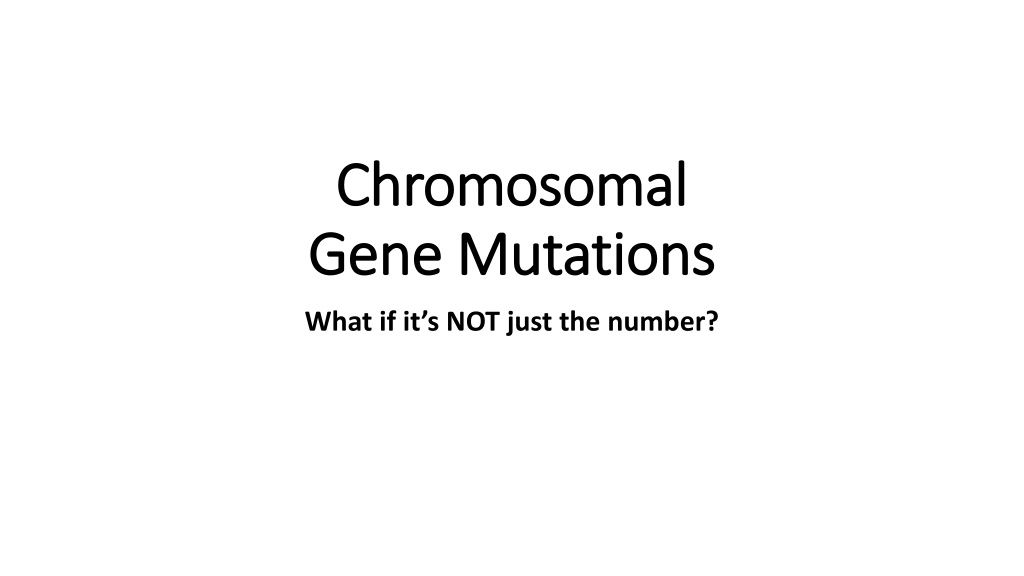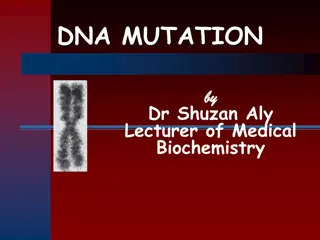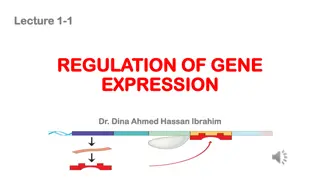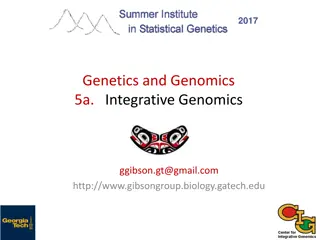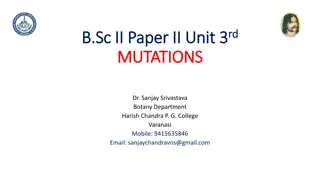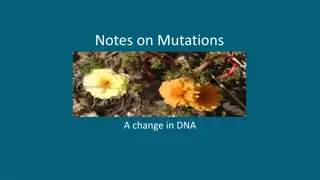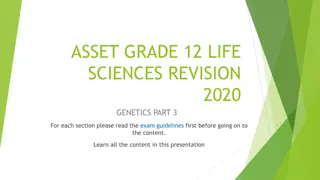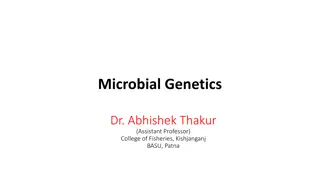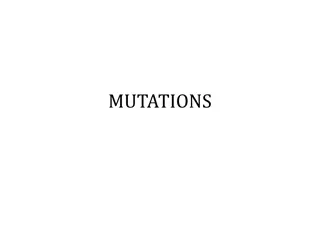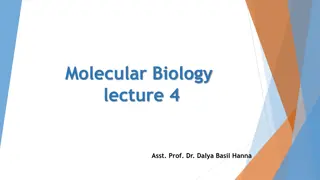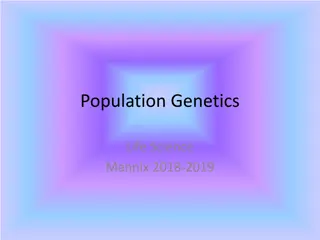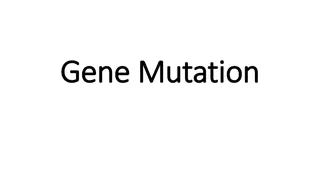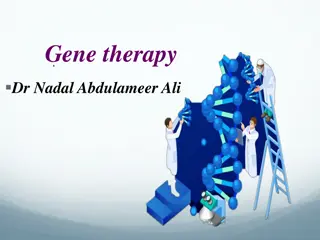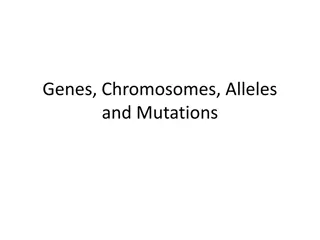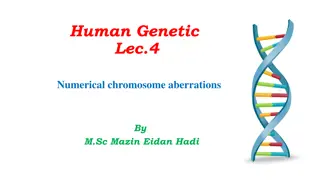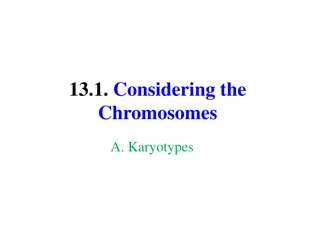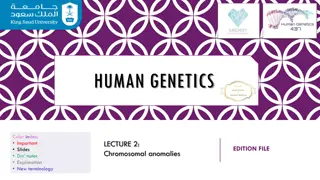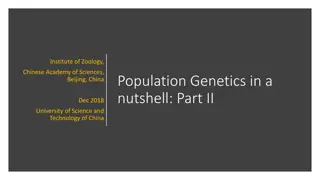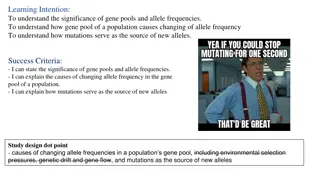Chromosomal and Gene Mutations in Genetics
Chromosomal and gene mutations play a crucial role in genetic variations. Mutations such as insertion, deletion, and substitution can lead to significant changes in DNA sequences, affecting gene expression and cellular functions. Additionally, chromosomal mutations like deletion, amplification, inversion, and translocation can impact multiple genes on a chromosome, causing genetic disorders and diseases. Understanding these types of mutations is essential in studying genetic diseases and evolutionary processes.
Download Presentation

Please find below an Image/Link to download the presentation.
The content on the website is provided AS IS for your information and personal use only. It may not be sold, licensed, or shared on other websites without obtaining consent from the author.If you encounter any issues during the download, it is possible that the publisher has removed the file from their server.
You are allowed to download the files provided on this website for personal or commercial use, subject to the condition that they are used lawfully. All files are the property of their respective owners.
The content on the website is provided AS IS for your information and personal use only. It may not be sold, licensed, or shared on other websites without obtaining consent from the author.
E N D
Presentation Transcript
Chromosomal Chromosomal Gene Mutations Gene Mutations What if it s NOT just the number?
Gene Mutations Gene Mutations Damaged Chromosomes sometimes a portion of a gene or chromosome is lost or damaged during meiosis Gene mutation a mutation that affects the gene Insertion one or more nucleotides are added within the DNA sequence Deletion one or more nucleotides are removed (lost) from the DNA sequence Substitution (point mutation) an event in which a single nucleotide is replaced with a different nucleotide
Mutations Type Definition Example Insertion A new nucleotide is added TAGCCAGATA TAGCGCAGATA Deletion A nucleotide is removed (lost) TAGCCAGATA TAGCAGATA Substitution (aka Point Mutation) A single nucleotide is replaced with a different nucleotide TAGCCAGATA TAGCCAGTTA
Chromosomal Mutation - Deletion Chromosomal mutation a mutation that affects multiple genes on a chromosome Chromosomal deletion an event in which a piece of the chromosome is deleted Can remove one or more genes from chromosome
Chromosomal Mutation - Amplification Chromosomal mutation Amplification Amplification a large piece of the chromosome is repeated/duplicated Causes two or more copies of one or more genes
Chromosomal Mutation - Inversion Chromosomal mutation Inversion Inversion one or more nucleotides break off and are flipped over before being reinserted/ reattached Reverses orientation
Chromosomal Mutation - Translocation Chromosomal mutation Translocation Translocation is when segments of DNA (nucleotides) move from one chromosome to another chromosome Translocation one piece of a chromosome is incorrectly inserted into a different chromosome OR when two pieces of different chromosomes are interchanged
Translocation Translocation
Effect of Mutations Mutations are ANY change in the DNA sequence! Change to the nucleotide sequence may cause an incorrect polypeptide (protein) to be made Incorrect polypeptide means the protein may not function properly Incorrect sequence = incorrect shape Incorrect shape = incorrect function
Substitution Mutations - Silent Substitution mutations can affect genes in multiple ways Different nucleotide does not always change amino acid used Silent mutation a mutation in which there is no effect on the polypeptide chain created No visible affect
Substitution Mutations Missense Insertion Different nucleotide does not always change amino acid used Wobble base! (I ll explain later!) Missense mutation a mutation that results in the insertion of a different amino acid May change proteins created
Substitution Mutations - Nonsense Different nucleotide may cause the ribosome to read the codon message incorrectly Nonsense mutation a mutation in which a stop codon is expressed early, creating a shorter polypeptide chain Greatly affects protein created
What the heck is a codon anyway? Remember this? Pls txt whn you get a sec Hnd the wrk out ltr Stp whn dun
Frameshift Mutations VERY BAD! Codons are read three nucleotides in a row Insertions and deletions cause frameshift mutations in the reading frame Frameshift mutation a mutation in which the codon reading frame is changed, potentially changing ALL codons following Since Codons are read in groups of three nucleotides, addition or removal of a nucleotide changes the entire reading frame Different polypeptides produced
Good, Bad or Nothing? Mutations may have an effect on fitness (chance of survival) Beneficial mutations a mutation that increases an organism s chance of survival (fitness) Fur color may allow organism to better blend into the environment, avoiding predators Harmful mutation a mutation that decreases an organism s fitness May make protein used to carry oxygen less efficient Neutral mutation a mutation that does not affect an organism s fitness No change in proteins All silent mutations are neutral mutations
